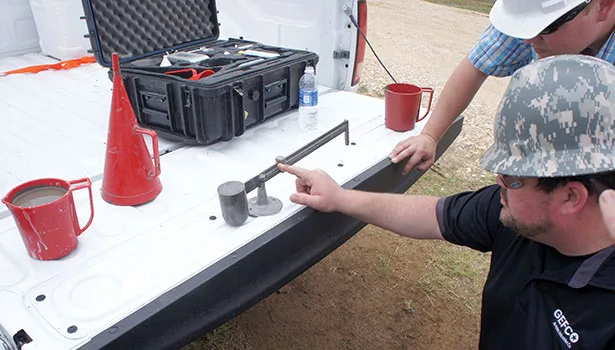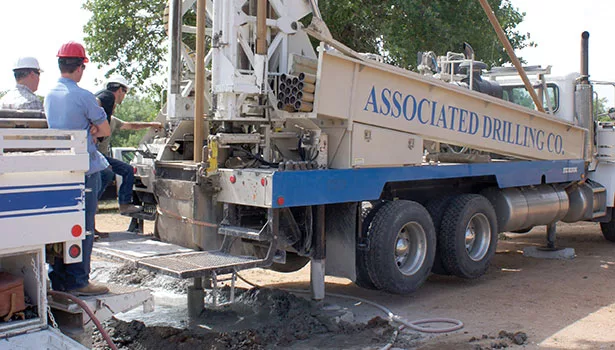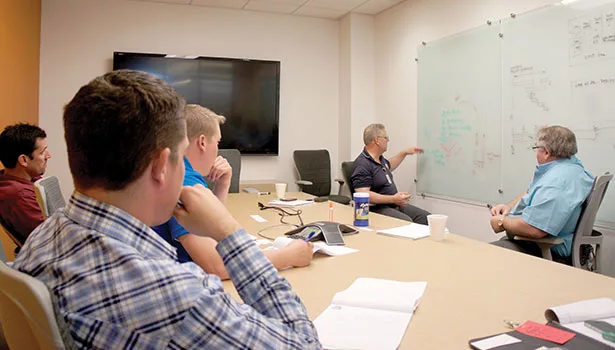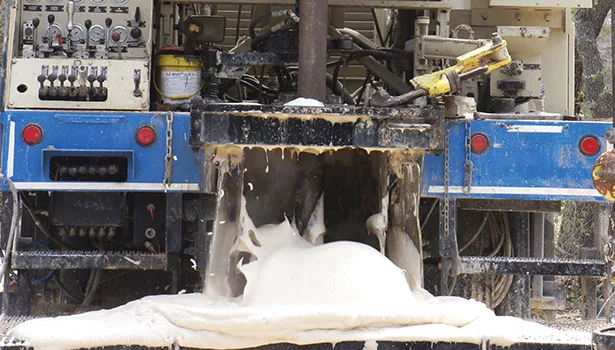Interns Can Fill Age Gap in Water Well Drilling Industry








The earliest form of water wells dates back to 5000 B.C. At that time, the world population was estimated to be around 5 million people. By the year 2020, there will be 7.6 billion people in the world, and our need for water will have never been greater. Fortunately, our innovations have improved by leaps and bounds from the primitively dug wells of 5000 B.C. to modern times. As we continue to improve and innovate, one of our greatest challenges will be attracting young professionals to carry on our work. If we plan to provide water for 7.6 billion people we need to start recruiting now. We need a road map to bring in young adults interested in the water and industrial drilling industry.
|
Do You Hire Interns? Vote now in our latest National Driller poll. Click here. |
The job opportunities in the groundwater and industrial drilling industry are endless. An interested and motivated young person can start this path at any time by attending workshops hosted by our state groundwater associations, the National Ground Water Association, the American Groundwater Trust and many other related manufacturer-hosted schools. The water and industrial drilling industry is constantly evolving, and it is always good to look at the cutting edge and ask how it fits your future or your family’s business. These schools are a great place to see innovation and new technology. If you see a school that interests you, sign up as soon as you can, as space is limited and they often fill up a few days after posting.
Likewise, there are many colleges that offer great groundwater science, drilling, and hydrology programs and classes. Just ask your local college or university what they have to offer. It is not necessary to have a main focus or major in groundwater topics to be an industry professional. I know many young professionals with degrees in business management, biochemistry, civil engineering, groundwater science, geology, creative writing and even theatre directing. All of these individuals have found a good fit working for an industry manufacturer, drilling company or water well supply house. While in college, it is great to seek out an internship. Most companies have internship opportunities and love the free labor you offer; I got my start in the industry interning for Baroid IDP.
I grew up working for my family’s water well drilling business in Michigan. In 2003, when the industry slowed to a crawl, I ran to college. I planned never to go back to drilling wells again. I told my parents water well drilling was not going to define me. However, I am glad that I got pushed back on track. I attended a drilling fluids school hosted by Baroid IDP. I asked the instructor, “How do I get your job?” He handed me his keys and said, “You can drive to Kentucky and teach this same school tomorrow.” That instructor, John Christ, pushed me back into the water industry.
The following summer, I traveled with Baroid IDP field representatives. I saw every form of drilling imaginable. Dave Donald, the global manager for Baroid IDP, designed the program to cover all the industrial drilling markets. The internship ultimately turned into a job and a professional career that I love. I have Dave and John to thank for my start in the industry.
The internship process is fairly easy. Once you find a company you want to intern for, you will submit an application and possibly an essay about why you want to be an intern. Then, once you are selected, it is up to you to get the most out of your summer or semester. Internships are a two-way street; you get to learn about the industry, and the host company gets to learn from you. You will also want to ask the right questions to ensure that you align yourself with the internship that fits best. Here are some great questions to ask:
- What will I be doing for the summer?
- Where will I be going?
- Who will I be working with?
- Does the internship pay?
Most long internships provide reasonable pay for the summer. Check the U.S. Department of Labor website for criteria of paid versus unpaid internships. Make sure to get a detailed timeline of your internship. Take notes and document everything you learn. Make sure to coordinate with your college if you are looking to receive credit for the semester. An internship can lead to a great job opportunity. The key to a great internship experience is to remember that whatever you put into the internship is what you will get back out of it.
Ryan Marcus and Dylan Logan are two college students that can testify of the value of the internship experience. These two young men attended GEFCO’s first field internship in May, which I had the privilege of hosting.
The goal of the GEFCO field internship was to immerse these two students, Logan of California and Marcus of Minnesota, into several different drilling disciplines in one week. We started the week at the GEFCO facility in Enid, Okla. At GEFCO, Logan and Marcus toured the plant with Dave Briner and learned about the rig manufacturing process. On the second day, we visited Marlowe, Okla. Van & Company Geothermal was drilling a 200-foot geothermal hole with a GEFCO 135 table-drive rig. The goal for the day was to learn about ground source geothermal and to evaluate the performance of a table-drive rig over a top-head-drive rig. On the third day, we met with Mike Epley, GEFCO salesman for Texas, and watched a GEFCO 30K drill in granite. Central Texas Drilling was installing a 300-foot residential well near Austin, Texas. I asked the interns to evaluate the air hammer drilling in granite. That afternoon we watched Kutscher Drilling use a GEFCO 50K to drill a 24-inch municipal well with foam for the city of San Marcos. I asked Marcus and Logan to compare the difference between air hammer and foam drilling.
On Thursday, we visited Baroid IDP in Houston. Marcus and Logan got to learn from three of the best drilling experts in the world: Ed Anderson, Jeff Blinn and Gary Williams. The interns had the opportunity to learn about drilling fluids and how they apply to drilling in their part of the country. We wrapped the week up on a 48-inch municipal well near Bryan, Texas. It was a conventional mud rotary hole being drilled to more than 2,000 feet. Josh Hathcox of Weisinger Well Drilling took time to teach the interns about large-diameter drilling and site management. Both took excellent notes, asked great questions and made the absolute best out of their week. They traveled home with new drilling techniques and new ways to approach their jobsites. The GEFCO field internship was only six days long, but we traveled 2,200 miles, met many successful industry business owners and learned a lot.
“My experience with GEFCO’s internship is something I will never forget. I feel more confident today as a driller and look forward to seeing what the future holds for this industry,” Logan said.
“I can’t wait to use what I have learned during my week with GEFCO,” added Marcus.
If you are looking for an internship or you are a company looking for an intern, it is your responsibility to close the age gap in the water industry. There is nothing more special than making water come out of the ground, other than getting to share that experience with others. To all the young professionals out there about to choose a career, the time is now to become part of the most important industry in the world.
Looking for a reprint of this article?
From high-res PDFs to custom plaques, order your copy today!













